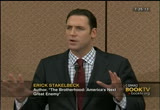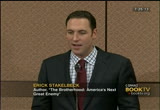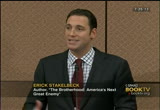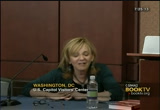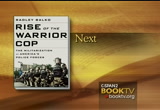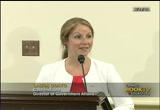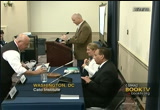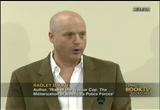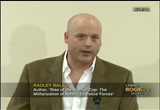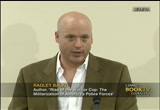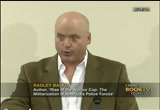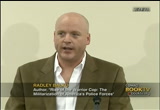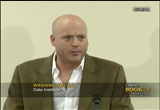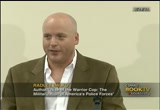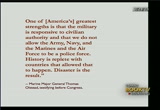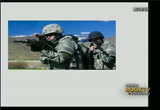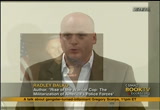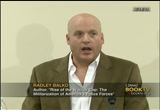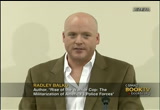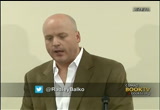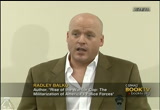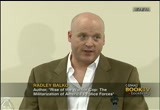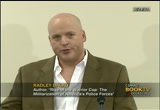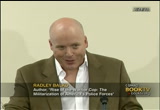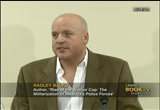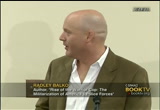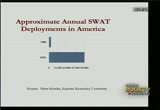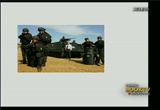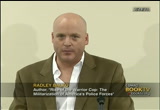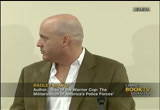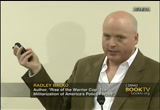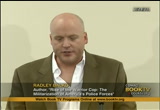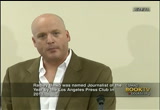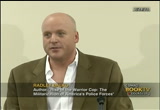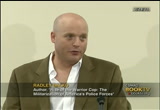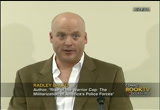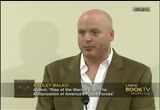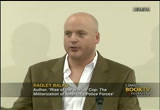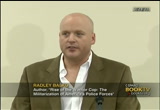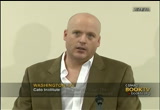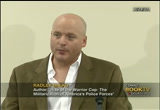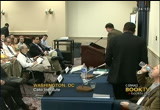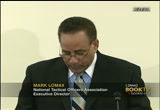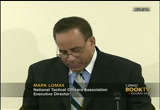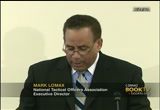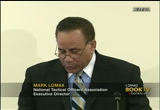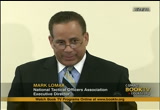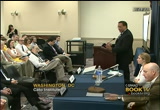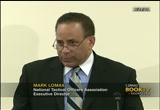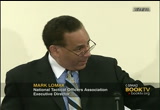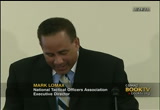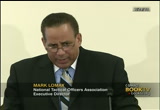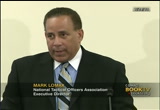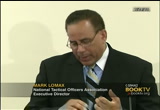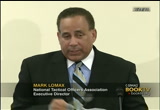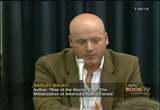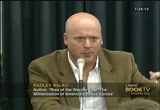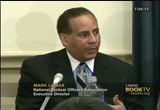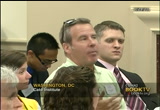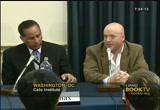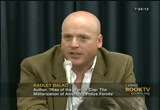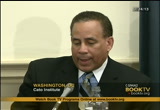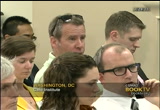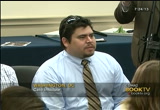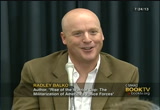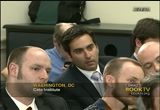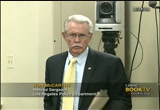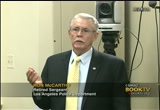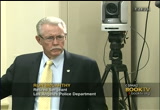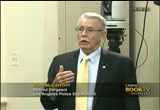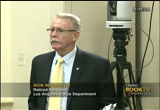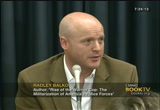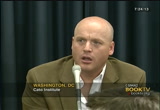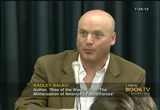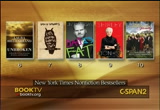tv Book TV CSPAN August 10, 2013 8:45pm-10:01pm EDT
8:45 pm
document in the book the occupy wall street movement anarchist communist marxist socialist anti-american, the islamists from the iranian regime to the brotherhood hamas hezbollah the american islamist groups like care they were cheering for occupy wall street. it's amazing. i couldn't believe it in my research for the book. the supreme leader of iran was giving statements wholeheartedly between -- behind occupy wall street. wall street. am i to judge said i believe it was him who said we are the 99%. i said i think i'm onto something here. when you're writing a book you keep digging and you discover one thing and you go down another rabbit hole and the research took reasoning and what i found it nice that i'm going to research this. i couldn't believe it. i laid out hamas.
8:46 pm
the iranian regime has the law supporting occupy wall street. they weren't supporting the tea party by the way. at the end of the day i figured it out they share a common enemy despite their differences. they share a hatred of judeo-christian civilization. the enemy of my enemy is a friend and although they disagree on a lot they won't undermine the west is real traditional judeo-christian western civilization. or at the end of the day if islamist got their way and sharia reigns of pain the left would be the first to put that on the chopping block. it happened with the ayatollah khamenei. they supported the ayatollah's rises six months later they were locked up in evin prison and
8:47 pm
executed. cautionary tale for for the left today. don't be so short-sighted and naïve. i'm not obstinate -- optimistic he will change your mind. >> israel has a very robust community. as you know in iran and in gaza as subnine we have no such problem. when the community wanted to participate in a parade they would not let them because of the occupation. this perfectly illustrates his point. there is this horrible collusion between the extreme left and the islamists. >> ayub also -- the acquittal of george zimmerman. >> thank you very much. i want everyone to buy the book.
8:49 pm
>> thank you very much for coming today. we are going to go and get started and the director of government affairs for the cato institute and today we are talking about radley balko's new book "rise of the warrior cop" the militarization of america's police forces. in the book it goes through sort of the current state of where police forces or which is a little bit different than it used to be and what people realize they are. i want to do so speakers in a moment that a quick thing about what we are going to do today. we are going to have bradley. >> first and mark lomax will talk about the issue and plenty of time for q&a with you all. they also want to note on the cato affiliated web site police misconduct.net we have a rainman -- map that goes through the instances in the details of the story in an ongoing resource for anyone interested in this topic which i think it's all of you. let me briefly introduce her speakers and we will get
8:50 pm
started. radley balko is the investigator reported for the helping "huffington post" helping of postbreakup or civil liberties in the criminal justice system and he is a former senior editor for reason magazine and his work has been cited by the supreme court. his writing is cited as an excerpt of the mississippi seizing supreme court and has had a direct impact. mark lomax is effective after the national technical association data previously worked in liberia west africa is a program manager for the united nations overseeing the liberian police and emergency response unit and a police response unit. he is also served as director for the bureau of education beauty retired from the pennsylvania state police for 27 is a service and a graduate of the fbi national academy. with that i will turn things over to radley. >> thank you and thanks for cato for putting this on and thanks for mark and the nt 08 for
8:51 pm
agreeing to have a conversation with us today. i'm just going to jump right in. so, right around thanksgiving in 2006 a narcotics task force in the atlanta police department was out on patrol i guess and they saw someone walking alongside the road that guy that they had previously arrested for various drug offenses. they jumped out on him through him to the ground pulled a gun on him and a week later found out he planted -- they planted a bag of marijuana on him. they nearly had a long rap sheets to they told him he would let him go if he told them where they could find a supply of drugs. he made up an address basically on the spot spot and beatrice happened to be that of catherine johnson and 92-year-old woman who lived in a rough part of
8:52 pm
atlanta. katherine judson kept the rest rescue of over by her bed she used to scare off people when she felt threatened. what is supposed to happen at this point when they get a tip is they are supposed to get an apartment to do a controlled buy from this address. but that process could take two to three days in atlanta and they wanted to get to the drug supply immediately for reasons that i will explain in a minute. instead they made up an informant. just like on the affidavit and created an informant out of thin air. claimed he had bought the drugs from this address instead of taking a few days to process it took a few hours and by later that evening they were breaking down cathy johnson story. she heard people breaking into her house and she gets up grabs her trustee resting nonfunctional revolver. when they break down the door she standing there holding the gun they opened fire and killed her. now they originally claimed she fired first and they later found out it wasn't true.
8:53 pm
two officers were hit by bullets fired by one of the police officers. they called to ambulances for the wounded officers and did not call an ambulance initially for catherine johnson. instead they handcuffed her and left are dead on the living room floor. one officer went down in the basement to plant marijuana which they claim she had sold. at this point they realized they had to cover their tracks. they had to find an apartment who would with a who would say he was a informant named in the search warrants so they go to this guy to they have used in past investigations and informants tend to be somewhat shady characters. rival drug dealers and drug attics trying to get there on charges dropped or diminished and to his credit this guy would not play along. there was this amazing 911 call where he dials the number and says they are trying to get me to say i kill that old lady and
8:54 pm
i don't want any part of it. he realizes this is commerce a show in with the police officers in going well so he jumps out of of the car in search of play. they pursue him and there's a surreal chaser downtown atlanta where he is trying to run and running to businesses and they are chasing after him. he is also working with atf at the time period he finds a phone and calls his atf officer who picks them up and dragged him out to the suppers. now there's a federal investigation. but we found in a federal investigation was that this was random and atlanta that the search warrant lying is common in these raids were common. in fact there was an 80-year-old woman who had been previously been rated. the atlanta city council held hearings where lots of other people came forward and said yes this also happened to us. and what the federal investigation found was there were quotas on the atlanta narcotics office.
8:55 pm
they arrest so many people each month and this is how their performance reviews were done and this is how they decided who got raises and promotions. this is how they are evaluated on how they did their jobs. the federal investigation didn't get into this but there was a reason why and that is because their federal grants that go strictly towards drug. we have these police departments competing for this limited pool of federal mining and it goes towards drug policing. there is pressure on the police department to produce the kinds of statistics that will make the department competitive for these funds and they pass that pressure on to their individual officers. eventually the entire narcotics squad was either fired or transferred to another department. there were promises for reforms that really didn't end up panning out in the end and they had to create a civilian review board but it was later sort of
8:56 pm
rendered by losses from the police union. in the end is this 92-year-old woman was killed and very little changed in terms of actual policyges. the story sort of embodies a lot of what i talk about in the book. the misplaced incentives and the perverse incentives and the use of these forced entry tactics. this wasn't a swat team necessarily. it was a narcotics task force but a forced entry at night. the incentives to take shortcuts around the fourth amendment. certainly not applying search warrants but implying these incentives create an inducement for taking shortcuts. so i'm going to get into this. this is an old quote commonly interpreted by winston churchill it was a sentiment that for a
8:57 pm
long time this is how we distinguish ourselves from eastern bloc countries from police states. democracy is probably -- the milkman and i bring that will back up to show you a perspective so by the time we get to the end of the look she can look back on that quote and see how far we have come since the cold war. in the u.s. we have always had this firm line between the military and the police. there is there's a good reason for that. the military's job is to -- and the job of police officers to protect our rights and to keep the peace. they are not similar jobs at all. the only similarities are that they both carry guns and are authorized to use force. many seem to think that jobs are similar which reveals a lot about what the policies or that we have today but for the most
8:58 pm
part we have done a good job keeping the military or domestic policing. we don't have soldiers strolling streets and conducting search warrants although during the reagan administration there was a push to do that. and during that push it was reagan and members of congress that they wanted to bring in military troops to start patrolling streets and conducting drug rates and making arrests and it was the military to push back on this. it was one of a few bad ideas that didn't pass during the reagan of. this was the number two man at the pentagon at the time thomas bolstad. you can see basically this is from his testimony to congress that this is a very dangerous thing to do to bring the military into domestic policing historically has resulted in disaster. we have done a good job in domestic law enforcement but i argue an ibook that we have done an end around this posse, taught
8:59 pm
us. instead of bringing soldiers into domestic law enforcement we have allowed police officers to basically be armed like police like using the tactics of the dressed like an adult the mindset of soldiers. the outcome i think is just as troubling as if the military were doing policing themselves. i'm going to play a quick little game here. this is a game called cop or soldier. i will show you a photo and you can save police officer or soldier. these photos are police in the u.s. or u.s. military. this is a cop. soldier. cop. those are actually cops. soldiers.
9:01 pm
9:02 pm
he got the green light to go ahead with this idea. the original acronym was over this and it is probably not a good idea. it ended up being televised and it was a few years later on the pending liberation army and they really kind of move this concept into the pop culture. there were these tabloid news stories of the day. when they had cornered the
9:03 pm
building, they have the shooting i was going on. in a really kind of pushed it into pop culture. these heroes that were taken on domestic terrorist groups that a lot of people were afraid of. so we get a tv show, which i highly recommend. it's kind of one of those 70s cheesy talk shows. and there was a little diecast building and it was really kind of interesting that it became part of his big idea. at the same time nixon declares war on drugs and one of the interesting things about it is that it originally was and the
9:04 pm
rockefeller administration in new york. and rockefeller had bought brought up the idea and it was not something that was, that the police chiefs were clamoring for a criminologist. it was basically a political ploy. something that he wanted to pass and showing he was getting tough on drugs. this applies to federal agents working across the country they decided not to use it.
9:05 pm
i'm not saying that they are not using this is as the time went down, but it clearly did not hurt things and making things worse. nationally these federal narcotics officers started investing these things across the country and this was a company by a lot of rhetoric from the nixon administration. really using this martial rhetoric, saying that we have to declare all-out war. and then we talk about connecting wines and being in the wrong houses and several of these things get some news coverage and we find dozens more cases and congress holds hearings and they bring these people into testified and three years later the repeal these
9:06 pm
laws and actually pass another law making the federal government liable. it was like ours could sort of say that went too far here. so throughout the 1970s these trends continued. in 1975 there were about 500 s.w.a.t. teams throughout the 70s that had bought into this original purpose. situations that are being used to respond to riot after shooting situations and hostages they are used in a way that is very effective and it seems to be moving along in its own way. it is usually undercover officers in plain close. it was really during the 1980s
9:07 pm
9:08 pm
them going far enough. so they serve a bipartisan race. at one point said he had no moral objection to publicly beheading drug dealers. and gates said that he also thought that dealers should be taken out in the street and shot. this is a position that he took when his son was caught with drugs a couple of times. but you see this ratcheting up and reagan brings the national guard in, he starts doing drug enforcement he create these joint task forces working on drug intervention efforts. he starts making these anti-federal drug ransom also starts making this military
9:09 pm
quitman available and this is defense department equipment that they are allowed to start accessed using. there are lots of examples of this in the book. his rhetoric really starts to hit agencies across the board. i mean, this is striking to me. it has to be a muscular more like the normandy invasion. >> we have these federal grants that are tied and then there is
9:10 pm
a strong financial incentive to use it. we also have asset forfeiture, which allows you to prove it that you own the property legitimately. so you have this and you could sort of keep it in mothballs with one of these legitimate emergencies to creep out. or you could spend amounts on these drug raids which have the potential to bring revenue back to the police department. so they did a series of things across the country and they went to the early '80s. what they found is in the late 70s there were about a few hundred s.w.a.t. raids per year across the country are so we are
9:11 pm
9:12 pm
9:13 pm
so these are just some various photos and he talked about this in maricopa county. where he had been deputized by the sheriff, and they were failing entrance filming a reality show because they are euthanizing these chickens and as you can see this as well. so this is another trend we are seeing we have to be prepared.
9:14 pm
now, to get a lot of coverage when it happens. and so the numbers we anticipate because of the estimates of the average middle school and high school campus can expect to see a homicide on campus. so there are plenty of drug dealers on college campuses to keep them busy and up and running. so these are a couple of ways that we have this for the cato institute.
9:15 pm
and there is no particular way to catalog these. so this is like maybe they got the wrong house, but the child was killed in the crossfire. and that another person was killed during one of these raids. the first was in 1996 when california legalizes medical marijuana. until this point the argument for this kind of force is bad
9:16 pm
drug dealers were dangerous people that were heavily armed, they have no moral qualms about killing police officers and their rebuttals to those arguments, but those were the arguments being made. that we need this kind of force to respond to a proportional threat. california legalizes medical marijuana and follow suit and the government responds by sending s.w.a.t. teams to these medical marijuana clinics. so these clinics are openly operating and they are operating under state law. they are not going to take a gun out from out of the counter and told them to federal agents. so i waited a minute that this is kind of the terrorizing
9:17 pm
development. this is not normally what happens with a free society. so this major milestone, this is probably in the last decade or so. where stories were being used for increasingly heavy crimes. we see responses from local communities where the s.w.a.t. teams are now reading these neighborhoods. in some cases there may have been legitimate, significant gambling operations. but in other cases they were openly advertising base.
9:18 pm
they were conducting charity gains that were in compliance, they need to change how you're doing it based on the s.w.a.t. team that scare the heck out of everyone. so we have these guys doing an alcohol inspection and this was actually a drug investigation. so now this is officially an alcohol inspection. so the guy brought a federal lawsuit and the federal court of appeals actually said that there is nothing unreasonable about sending a s.w.a.t. team to enforce predatory law.
9:19 pm
and so he called up the state occupational licensing board he sent an inspector along another inspections to make sure that these barbers were properly licensed to cut hair. this is almost true of any government entity. there is always a suspicion we try to seek out the reasons for your existence. at one point in the 70s they were the absolute last resort and now they are increasingly being seen as a first resort. i debated a police officer on fox news but ask is that they're
9:20 pm
actually lots of environments that serve every single search not what the s.w.a.t. team. >> i'm going to close with this. you'll have to read the book to get the shaquille o'neal story. this is a team of tibetan monks who overstayed their visa and naturally the response is from the s.w.a.t. team. we are seeing these aggressive responses that started in seattle in 1999. interviewing the police chief who orchestrated the response. he has seen how the response to the protest has been expect confrontation. police or protesters, it inevitably happens.
9:21 pm
9:22 pm
there was a police raid and a gentleman who lived on the other side actually had drug charges pending against him. his girlfriend's name wasn't on the wind. but they raided both sides of the duplex and cory had no criminal record and his home had an 18-month-old daughter about 1230 in the morning, he wakes up hearing people trying to get into his apartment. cory says he never heard him. he lay down with a gun by him with his daughter with him and the door flies open and cory kills officer ron jones.
9:23 pm
in his version of events is that he had no idea that he could shot and fire to protect himself and his daughter and as soon as he realized, he surrendered and dropped his gun. and cory looked out the window and saw the team of police it was coming at him and he decided to take them on with a handgun and he shot and killed one of them in and surrendered with bullets to left and gone. you can decide which of those scenarios you find more plausible.
9:24 pm
he said that he would get time served. and so i tell this story because at his homecoming party, it is very celebratory and he gets out to ride on his four wheeler and everyone is happy and joyous back with his kids grades are talking to his attorney about this, we were happy for him as well. i mean, this is a guy who had done nothing wrong, maybe he smoked pot on the side, but he is definitely not the jugular they were looking for. having people break into his home in the middle of the night, putting them in this situation where you do make a terrible decision. the state then tried to kill him, taken away from his child for 10 years.
9:25 pm
so he was taken away from his kids and he now has a felony record never vote. he has to clean the felon every he applies for the job. so this is a good outcome that we were relieved that this had happened and it was an illustration of how low i think our expectations have become on this particular issue that we could be joyous at this particular occasion. and so i think i will turn it over now to mark.
9:26 pm
>> good afternoon, everyone. i want to thank the cato institute for providing this forum first i want to acknowledge the dedication and service of the men and women in blue and what they provide to us every day. just yesterday i left orlando, florida and yesterday morning a young orlando police officer was shot twice during a traffic stop. he is recuperating and recovering.
9:27 pm
and i would like to thank the author for the release of his book. he has created quite a stir in policing things today which is a od thing. discussion and critique and review of any process, policy, law, and procedure that is good for the growth improvement or reflection of change. it is not of being up against them against us. to me, this accurate statement.
9:28 pm
the vast majority of police officers in the united states take pride in their duties and are actively involved in the service and protection of our communities. day in and day out, these men and women was the securities and freedoms of our public. however there have been times when actions have resulted in injury or death. therefore it is paramount to actively address the perceptions whether it is true or false. through forums like this and comprehensive research studies.
9:29 pm
externally and internally. to learn from or practices to ensure professionalism with tactical teams for trade and developed and not misused. we in the united states are sometimes flawed throughout the world. we should take pride in that accomplishment. we have had many checks and balances that ensure our freedom. one step check and balance is a freedom of speech. specifically, the media.
9:30 pm
it is necessary to ensure accountability and necessary improvements. moreover, the ability to effectively communicate is when law enforcement community provides a process allowing for the collective body of the best practices of internal accountability. we are talking to the tactical enforcement committee and the negotiators in the corrections. it does not have regulatory authority. it provides a forum for training and exchange of ideas to the quarterly publications and
9:31 pm
training classes and conferences. it advocates for professionalism and safety and performance standards in the community. most states have their own forms for training and ideas and commitment to professionalism and performance standards. between the state associations, we recognize the fact that their are times as mentioned in this book when the states were made to with tactical teams. sometimes lives are lost in injury sustained and even police officers feel the very important mission to save lives.
9:32 pm
9:33 pm
and the environment to develop this increases. the concept of the militarization today is the use of tactical teams and the furtherance of the concept. as mention the first s.w.a.t. team was developed and this has increased. today we are honored to have the lapd sergeant who was one of the first officers and lapd in the s.w.a.t. team. please send. thank you. he was personally involved in
9:34 pm
the situations mentioned in the book. the black panther party and the other one as well. >> we conclude that in the next book. okay. also, ron has some corrections again, the members represent some of the best tactical officers in the country to include large and midsize and small police departments.
9:35 pm
bring to the associates the wealth of their professionalism. the anti-away recently published their standards with the input from various individuals and state associations. these are recommendations and guidelines they will develop their own policies with the framework and in addition many states will have a non-bystander for their tactical needs. currently as mentioned, it is difficult to get a big picture on how they are used, the
9:36 pm
outcomes that are being used. there have been several limited studies in this area of the past several decades so i'm pleased today and we'll have the international association of police. we are covering the hope for the past 10 years and this was done with the research center. john is the research individual who is a director and he will be handing this to us. the state association are like a
9:37 pm
distinguished perception from reality and this includes myths with reliable information that proves otherwise were confirming and proper procedures or practices that need to be addressed. today as evident by your practices to move forward, particularly in regards to media and government bodies. the study will facilitate a more accurate view of these actions for perspective overtime versus focusing on anecdotal incidents. i know there are other areas of concern as mentioned in the book.
9:38 pm
we will have comments on this. and these initiatives need to be renewed and reviewed and discussed in a public forum with legislators and what the community can voice with the respect of legislatures. it is this process that changes can be made. again, it is all part of our second system that we have. so in closing, i would like to thank you for your participation or. i look forward to meeting with you afterwards. also if you have any questions for john foreman. anything you have after this question, we are glad to answer your questions. so thank you.
9:39 pm
>> before we open up the q&a, i would like to give mark the ability to address anything if you would like to speak on his part about this. >> just my couple of comments. i'm pretty sure we would disagree about what sorts of situations are appropriate for tactical units in my definition and range of situations would probably be much narrower. to the extent that we do have this, i would like to emphasize as i point this out but i do think that there are legitimate reasons for using these sorts of tactics. and that is when you have these immediate threats to life in these emergency tax situations. the chief objection is one you are using violence to diffuse already violent situations and the objection is one you are
9:40 pm
creating violence and complication where there was none before, which is what we argue as happening on these drug raids. they cannot like to emphasize that i do think that there are legitimate reasons for s.w.a.t. teams. so i do think it provides a valuable service that they establish the best practices and guidelines. if we are going to have these units, we want them to be as well-trained and professional as possible. that being said, obviously the black panthers were very well armed. i would not object to the use of those tactics. appropriating is for s.w.a.t. team. depending on whose story you believe, police officers responding to a noise complaint, or other scenarios, as he is about what happened. but i would not consider this an
9:41 pm
appropriate use for the s.w.a.t. team at all. it proves that it was a legitimate use for this kind of choice. that is about all i have come actually. >> reading this book, i went through and i agreed. >> can i quote you on that. [applause] >> we have had discussions in the past and we have agreed. we have agreed more than disagree. and the use of this or tactical teams should be limited. that is what we advocate, then it should not be used every day. it should be used for certain situations. so because of that we are grateful. >> you're killing my street
9:42 pm
credit here. [laughter] >> questions here in a. >> how dangerous is the police force? the fact is that half of that is part of this case. and we actually see in action at times. that could be reduced considerably if something was done in regards to the confrontational situations. almost everything shown shows some point of improper action. now, the details don't seem hardcover right now. but the fact is the police need to be prosecuted when they
9:43 pm
overstepped the law. so they are usually just let off the hook. there are exceptions, but the exceptions are rare. everyone has their rights and we basically live in a society of different people having different kinds of input. there are lots of bureaucrats. >> mean, i think this is a common frustration. i think that the number of rogue police officers is very small as a percentage of overall police officers. i think the frustration comes in when those officers are not held
9:44 pm
accountable. that suggests a more systemic problem and the other related issue is you have a raid when an innocent person gets killed and the reaction is that the police officers were following procedure and there is no criminal violations and also nothing wrong with the procedures and we're not going to change the procedures. so if an innocent person dies or no wrongdoing of the officers and there is nothing wrong with the procedures, the inevitable conclusion is it's perfectly acceptable to have innocent people died during these drug raids. either something went wrong with this is a tolerable outcome. that is the frustration. but when things go wrong i imagine that the vast majority of these are conducted in this
9:45 pm
way. but when things go wrong there doesn't appear to be any significant accountability and i think that is what people think as far as there is a more systemic problem. >> your first statement about being involved in traffic accidents more than being killed in line of duty. but that is a very big issue. because that vehicle is a weapon . whether they are being used to hurt others or hurt themselves. so that is a true statement. getting back to accountability, when i retired, i was in charge of the police academy. one of my speeches that i told
9:46 pm
to every academy class when they went to the academy when i was there. you are held to a higher standard than anyone house. 24/7, seven days a week, including your family. and you're going to be watch for anything that you do because you cannot get away without. the comes to police departments for prosecutors not prosecuting misconduct, that is an issue that they use that your community should take up. because those attorneys or the attorney general a publicly elected officials, those are the issues that you need to take a. >> it shows an overwhelming majority engaged in abrasive confrontational or excessive behavior in their dealings with
9:47 pm
people. >> is a mandatory that they basically talk about this and doesn't register? >> maryland is the only state that requires at this time. >> the question in the back. >> thank you. talking about the criminal side of it. we're talking about the rules and the policies. what about performing things and we talk about language. >> i mean, it is not going to be a popular opinion.
9:48 pm
but i do think that this does kind of put all of those where they are above the law. i do understand the argument that we need some sort of extra protection so they are not sort of hesitating before you can use force when it is necessary. it basically rules out negligence and you have to prove basically malicious intent before you can even get into a courtroom. the police officers aren't actually paying these families. it's very red that they have a jury that awards punitive damages. so yes, i do think, i don't know the legal standard. i think it would be good to create something under that and so the negligence can be addressed through the system. but right now it is tough to be in court.
9:49 pm
>> that's never going to fly, that's just not going to happen. >> you seem like a nice guy. two questions. as the state deliberately obtained this and if they are not advertising this, how can anyone in this room conclude a state of professionalism is not being better. >> to comment on professionalism, like the t-shirt from the state, that's a mistake. there is no way to qualify that.
9:50 pm
as far as the tank, it is part of the one in los angeles. >> yes? >> from the first armored vehicles was a carrier that my department paid for the second job that i had. training government and practical people. citizens were in our front yard after someone had shot them. we don't know whether they are alive or dead and therefore it is so obvious that we know do not know. so there is an order of
9:51 pm
priority. and it's one that we recommend in law enforcement. citizens say that it is part of the safety, end of story. we are shaking her head about the civilian officers officers at fort hood ones who entered and faced the psychologists who murdered people in portrait and she was shot multiple times and the sergeant of mr. hassan down. that is an example of putting citizens safety ahead of the police on the streets safely. other examples as well. >> back to the armored vehicle, they were utilized for a number of different purposes. one was places that were heavily fortified and that they were
9:52 pm
like a jail and then utilized for that. they filed a suit against him and you have no weapons attached to them. the only weapons that could be utilized for the weapons that they talked about in its that highest caliber was a 308. they were utilized appropriately he said they should be regulated and we showed them our paperwork and how we administer the use of those. that is how they were utilized and they were never done away with. maricopa county and the sheriff, who i really don't like, -- [applause] [laughter] >> i consider him a man of duty. now, having said that, he got a regular tax and unpaid it would
9:53 pm
the maricopa county -- and embarrassed his deputies. one because they were at uniform and that is part of it. to because they had put themselves in vulnerable positions and they were tactically unsound, either untrained or they don't listen to their training. the majority of those have more than 10 years on the job and it usually comes from complacency and my final point is the
9:54 pm
president of the united states is protected by secret service, as you know. you know that the motorcade security was developed and that is where they got it. so we have done good things together. the examples that he gave make me sick and i agree with you. some police department are not as professional as they need to be. but let's not take the concept that has worked and saved a lot of lives. and then get away from it without fixing the problem. and we want to do that and that is what mark is really good at.
9:55 pm
we are moving in that direction. one day i hope that i can reach your standards. i want to. >> two more short questions. >> i think that it stopped at 1033 program. i mean, this was equipment that was designed to be used on the battlefield. so i think from a symbolic standpoint that is important. but it is of things other than just this. they do start this multijurisdictional drug task forces across the country and
9:56 pm
9:57 pm
>> [inaudible] i believe that there was a defensive approach in some way and we are talking about this about how maybe there will be a better outcome. >> this is something that mark and i probably agree on. were these officers go to neighborhood meetings and they are encouraged to have a stake in the community and he has a stake in them. in the community sees it as one of their own, using forces to protect them. so more community oriented believe is important.
9:58 pm
>> one more sentence and we will start at the top. >> i wish i could take everyone's questions, but we are out of time. i'm sure there are panelists will stick around. thank you for coming, i think it's important that we we have a dialogue and continue to have a dialogue. thank you for coming, please join me in thanking our panelists. [applause] >> thank you for doing this. i greatly appreciate it. >> you're watching booktv, nonfiction authors and books on c-span2. >> here's a look at the best-selling books reflecting cells as of august 8. climbing to the top of the list
9:59 pm
are these selections. next, chief national correspondent for "the new york times" magazine examines the political and the workings of washington dc in his book this town. you can watch on august 18. until robinson talks about his autobiography, happy, happy, happy. up to dynasty fame. and the prisoner of the japanese in world war ii writes about her experience. it has been a bestseller for 39 weeks. and the next is a collection of essays. eight on the list is a comedy
10:00 pm
60 Views
IN COLLECTIONS
CSPAN2 Television Archive
Television Archive  Television Archive News Search Service
Television Archive News Search Service 
Uploaded by TV Archive on

 Live Music Archive
Live Music Archive Librivox Free Audio
Librivox Free Audio Metropolitan Museum
Metropolitan Museum Cleveland Museum of Art
Cleveland Museum of Art Internet Arcade
Internet Arcade Console Living Room
Console Living Room Books to Borrow
Books to Borrow Open Library
Open Library TV News
TV News Understanding 9/11
Understanding 9/11